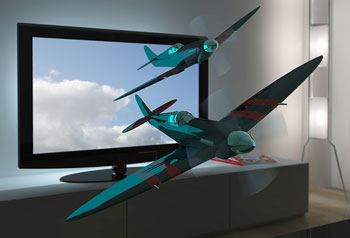The BBC’s two-year long 3D television trials are set for the chopping block after the UK public service broadcaster admitted a distinct “lack of appetite” for the technology among viewers. The decision to axe 3DTV trials confirms what we’ve been predicting for quite some time – that 3D TV is basically junk.

The BBC’s head of 3D Kim Shillinglaw gave an interview with The Radio Times, in which she revealed that the experiment will end with a Doctor Who anniversary special to be screened in the third dimension this November. According to Shillinglaw, British audiences find the whole experience to be “quite hassly” (due to the need to wear 3D glasses), and as such, 3D television has failed to take off.
It’s a bit of an anti-climax considering the initial promise of the display technology. The Beeb’s experiment began back in 2011 and for a while it seemed as if it might be successful – the organisation claimed that fifty percent of the 1.5 million UK households with a 3D-capable HDTV tuned in to see its coverage of the Olympics opening ceremony last summer for example. But since then, audiences have declined dramatically, with just five percent of 3DTV owners bothering to watch Mr. Stink and the Queen’s Speech over the Christmas period. Earlier this year, the BBC’s Andy Quested admitted at the Future TV summit in London that audiences were becoming “less and less enthusiastic”, while the broadcaster’s failure to inform us of its plans to screen this year’s Wimbledon semi-finals and finals in 3D until the last minute was yet another nail in the coffin.
So is the concept of 3D broadcasting in our homes done and dusted? Well, not entirely, for there remains a glimmer of hope for the few 3D enthusiasts – according to Shillinglaw, tri-dimensional television hasn’t been completely written off just yet.
Although she’s planning to give up her position as the Beeb’s head of 3D, and will assume her previous role as head of science and natural history programming, Shillinglaw remains optimistic over 3-D’s long-term prospects:
“We will see what happens. There might be more take up of 3D TV sets when the recession ends, but for now we’ll just have to wait and see. I’m not sure its the BBC’s job to decide on 3D’s fate.”
Ultimately though, the prospects don’t look good for 3D TV. While British Sky Broadcasting (BSkyB) is continuing its own experiments in airing sports and other content on its Sky 3D channel, other broadcasters seem to have come to the same conclusions as the BBC. Just last month, ESPN pulled the plug on its own 3D channel in the USA due to a lack of interest in the technology.
Source: Radio Times